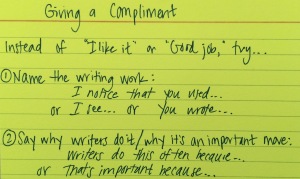the common core places value on peer feedback as evidenced in writing standard 5. teachers that we’ve talked to sometimes hesitate to spend too much time on peers giving each other feedback, not seeing the benefits of this talk. often, they’re concerned about the productivity of things like peer editing or turn and talks that request feedback. if students are turning and talking about their after school plans or turning and just having “agreeable talk” then we agree that this isn’t a good use of time. if your students give feedback that sounds like “i like it a lot” or “nice job” , this is agreeable talk and doesn’t really add value besides the temporary good feeling they get from a very non-specific comment. on the other hand, if kids are giving each other specific feedback, this can be a very powerful way to prompt revision.
imagine a scenario where two students are discussing a piece of writing and you overhear conversation that sounds more like this: “I notice that you used comparisons when you were trying to explain just how fast a cheetah is. that’s important because it helps your reader by giving an example they can picture. maybe next time you could try using more comparisons in your piece.” more valuable than “that’s really good.”? more effective? we think so.
one way to do this is to give students an index card with these steps printed on it for them to keep in their notebooks and pull out whenever they’re giving feedback to their peers:
with practice, your students will internalize this practice and you’ll notice that they won’t pull out their prompt cards and you’ll start to hear the kind of feedback that makes a difference in student writing.
what do you do to scaffold and encourage effective feedback amongst peers instead of just agreeable talk?
look for a future post about a writing craft moves chart that will help support your students in naming the work that writers do.
(for more thoughts on how to think about language, we recommend peter johnston’s books. his research on the effects of language helped shape the way we’ve taught students to give feedback.)


11 thoughts on “giving peers feedback that matters”